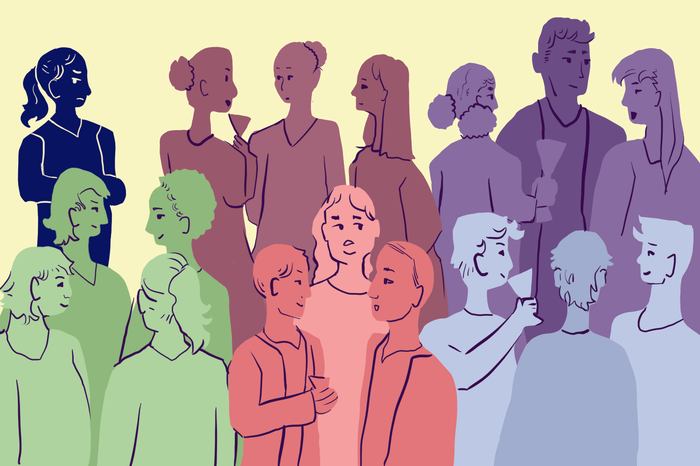Notebook: on self and Substack
Daisy Bates asks why we are so eager to read each other’s minds

A month before the pandemic, I reinstalled Snapchat. I had a massive crush on a boy who barely knew my name and, in a desperate plea for his attention, fourteen-year-old me decided the best mode of seduction would be wishing him a happy birthday. Unsurprisingly, this didn’t work. I think I’m still on delivered. I kept the app for pride (… fine, to see if he’d reply) and when the world closed its doors I formed a new fixation: the private story.
I was late to the party – perhaps that explains my infatuation – but I opened my heart to ‘My Funeral Guest List’ and ‘Feta Cheese’ and the aptly titled ‘aaaaaa’. I churned out hours and hours of content: book hauls and fit checks and, god forbid, confessionals. I’m sure any viewership was reluctant. Actually, I’m sure most of the viewership was me. Because, though I am loath to admit it, I posted those stories to seem cool. I was young and insecure and would post tours of my Spotify playlists so everyone could celebrate my impeccable music taste. After a long night of talking to a screen, I would continue the conversation by rewatching said long night of talking to a screen.
“I didn’t know who I was and I felt the louder I was online, the more obvious my identity would become”
It was less about feeling superior (I very much did not) but about curating a perfectly polished online persona. If I stuttered or the filter slipped, I could re-film the clip. It was lockdown, and nobody but my mum could see the real me I tried so desperately to distort. I didn’t know who I was and I felt the louder I was online, the more obvious my identity would become.
This was 2020. I’ve since grown up. I switched from Snap to Close Friends and, let’s all cheer, to a diary. I stopped posting videos of me crying while watching Game of Thrones and instead wrote nonsensical poetry about my obscured sense of self. I was not sated. I began listening to podcasts, scrolling through Twitter and scouring Sylvia Plath’s journals, anything to drown out my new-forged thoughts with other people’s. Then a friend introduced me to Rayne Fisher-Quann’s ‘Internet Princess’, and the floodgates of Substack opened. There was no return. I’d gained entry to other people’s minds and it was glorious. Clearly, the only way to become a tangible being would be to take inspiration from other people and adapt to their perspectives. My diary entries began to be shaped by the content I’d consumed, and after regurgitating yet another point I’d read online, I felt that familiar yearning for selfhood. Somehow, after all of this work, I only felt farther from myself.
“I’m not sure anyone knows precisely who they are, and fewer still can summarise it into a sentence”
Odysseys are long, gruelling, and often anticlimactic. I’m not sure anyone knows precisely who they are, and fewer still can summarise it into a sentence. Maybe Jemima Clarke was right when she, in her infinite wisdom, wrote ‘I think you guys might be thinking about yourself too much’. A point I’ve seen circulating online posits that too much self-reflection is actually a bad thing, though I think that comes a bit late for me.
I’m sure I’m not alone in this. In the digital age, we’ve become chronically self-obsessed and self-aware, constantly conscious of how we’re perceived. We flit from thing to thing, begging to be heard and longing to be understood – by each other and by ourselves. A private story seems harmless enough until it’s Letterboxd and Goodreads and Receiptify and suddenly everything can be digitally quantified. You listened to Fleetwood Mac for 10k minutes? That’s cute! I’m in their top 0.005%. We’re a conglomerate of people blurring at the seams and howling to the void, commodifying our interests to flaunt them online. I guess that’s what I’m doing now.
This all seems a bit bleak, I know, so let me offer you some consolation: all hope’s not lost! Bad news, you may need to turn off your screens to see that. Outside of Instagram, there’s a whole world waiting to be felt and experienced. When the going gets tough, that’s the time to endure, not to drown your sorrows in another digital sob-story. If your thoughts get too loud, try sitting with them for a while – it’s hard but rewarding.
If they’re really that intolerable, speak to a friend, go for a walk, or try jotting them down. The feeling won’t go away with hours of screen time, it’ll probably only make you more confused. These are obvious solutions, but ones we’re quick to dismiss since the internet got us hooked on quick-release dopamine. Remember: you exist outside of social media. You are more than the content you consume. And that boy will probably never text you back, so please delete Snapchat.
 News / Cambridge bus strikes continue into new year16 January 2026
News / Cambridge bus strikes continue into new year16 January 2026 News / Uni members slam ‘totalitarian’ recommendation to stop vet course 15 January 2026
News / Uni members slam ‘totalitarian’ recommendation to stop vet course 15 January 2026 Science / Why smart students keep failing to quit smoking15 January 2026
Science / Why smart students keep failing to quit smoking15 January 2026 Interviews / The Cambridge Cupid: what’s the secret to a great date?14 January 2026
Interviews / The Cambridge Cupid: what’s the secret to a great date?14 January 2026 News / Cambridge local elections to go ahead in May despite local government reorganisation16 January 2026
News / Cambridge local elections to go ahead in May despite local government reorganisation16 January 2026









